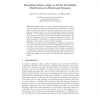Free Online Productivity Tools
i2Speak
i2Symbol
i2OCR
iTex2Img
iWeb2Print
iWeb2Shot
i2Type
iPdf2Split
iPdf2Merge
i2Bopomofo
i2Arabic
i2Style
i2Image
i2PDF
iLatex2Rtf
Sci2ools
139
click to vote
KI
2007
Springer
2007
Springer
Extending Markov Logic to Model Probability Distributions in Relational Domains
Abstract. Markov logic, as a highly expressive representation formalism that essentially combines the semantics of probabilistic graphical models with the full power of first-order logic, is one of the most intriguing representations in the field of probabilistic logical modelling. However, as we will show, models in Markov logic often fail to generalize because the parameters they contain are highly domain-specific. We take the perspective of generative stochastic processes in order to describe probability distributions in relational domains and illustrate the problem in this context by means of simple examples. We propose an extension of the language that involves the specification of a priori independent attributes and that furthermore introduces a dynamic parameter adjustment whenever a model in Markov logic is instantiated for a certain domain (set of objects). Our extension removes the corresponding restrictions on processes for which models can be learned using standard meth...
Related Content
| Added | 08 Jun 2010 |
| Updated | 08 Jun 2010 |
| Type | Conference |
| Year | 2007 |
| Where | KI |
| Authors | Dominik Jain, Bernhard Kirchlechner, Michael Beetz |
Comments (0)

